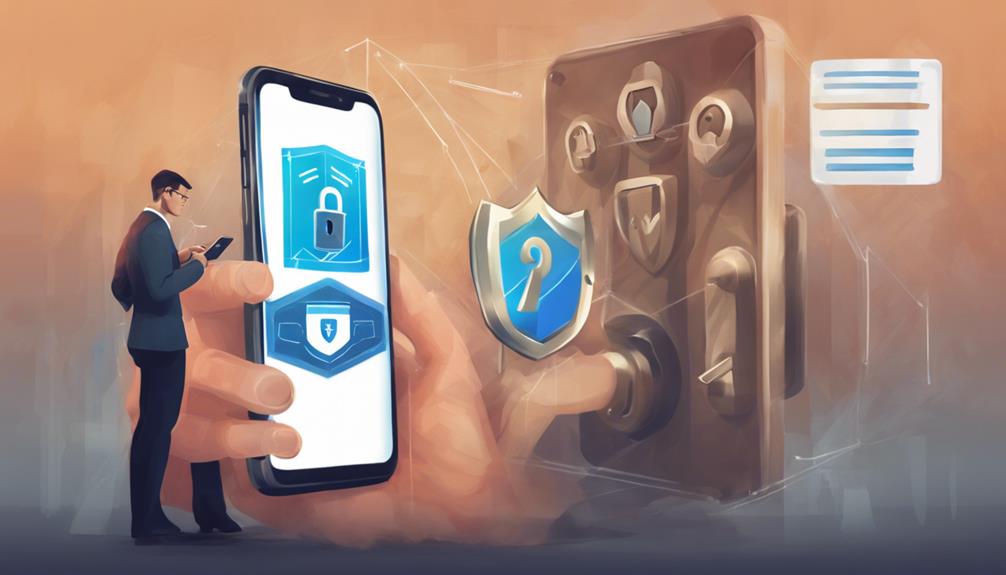When contemplating ethical hacking versus software engineering as career paths, one must take into account the distinct skill sets, growth trajectories, and financial prospects of each field. Ethical hacking emphasizes cybersecurity, offering roles like security analyst and penetration tester, focusing on safeguarding data against cyber threats. Software engineering presents diverse job roles such as software developer or technical architect, requiring proficiency in programming and design principles. Salaries vary but entry-level software engineers typically earn more. The choice between the two ultimately depends on personal strengths, career aspirations, and interest in cybersecurity or software development. Further insights await in the detailed comparison.
Key Takeaways
- Choose Ethical Hacking for cybersecurity focus.
- Opt for Software Engineering for diverse tech roles.
- Consider long-term goals and personal strengths.
- Evaluate salary potential and career growth opportunities.
- Assess job market demand for specialization options.
Understanding Ethical Hacking Career Path
An in-depth comprehension of the essential hacking career path is important for individuals aspiring to pursue a role in cybersecurity. Ethical hacking involves identifying vulnerabilities in systems and networks to enhance security.
Common roles within ethical hacking include security analyst, penetration tester, and security consultant. These professionals work with permission to assess and fortify the security of organizations' systems.
To excel in ethical hacking, one must possess skills in network protocols, be well-versed in cybersecurity tools, and exhibit strong problem-solving abilities. Furthermore, ethical hacking provides lucrative career opportunities, with positions like incident responder and penetration tester being in high demand.
Individuals entering this field can expect to tackle complex security challenges, contribute to safeguarding sensitive data, and play a significant role in maintaining digital defenses against cyber threats.
A career in ethical hacking offers a dynamic and rewarding path for those passionate about cybersecurity and making a tangible impact in the digital world.
Exploring Software Engineering Opportunities

Exploring the domain of software engineering reveals a multitude of promising career paths and opportunities. Software engineering encompasses various roles, including software developer, systems analyst, quality assurance engineer, DevOps engineer, and technical architect.
Specializing in areas like full-stack development, mobile app development, or cloud computing can greatly boost career growth and earning potential within the field. Proficiency in programming languages, understanding of software design principles, knowledge of databases and data structures, teamwork skills, and strong debugging and testing abilities are essential for software engineers.
Career progression in software engineering can lead individuals to positions such as system engineer, full stack engineer, IT security specialist, technical architect, or software development manager. Salaries in software engineering can vary based on experience and location, with entry-level positions typically offering annual salaries ranging from $50,000 to $70,000.
Embracing continuous learning and adapting to technological advancements are vital for thriving in the dynamic landscape of software engineering.
Skills Required for Ethical Hacking

To excel in ethical hacking, individuals must possess an essential skillset that includes technical proficiency in network protocols like TCP/IP, DNS, and HTTP.
Essential learning is fundamental due to the ever-evolving nature of cybersecurity tools and techniques, such as penetration testing frameworks and vulnerability scanners.
Ethical hackers need to stay updated on various operating systems like Windows, Linux, and MacOS to effectively exploit system vulnerabilities and secure networks.
Essential Hacking Skillset
A thorough understanding of network protocols, cybersecurity tools, and operating systems is essential for individuals aiming to excel in ethical hacking. Ethical hackers must be well-versed in network protocols such as TCP/IP, DNS, and HTTP to analyze and manipulate data traffic effectively.
Familiarity with cybersecurity tools like Nmap for network scanning, Wireshark for packet analysis, and Metasploit for exploiting vulnerabilities is vital in identifying and securing potential weaknesses in systems. Additionally, a profound knowledge of operating systems like Windows, Linux, and Unix is necessary for ethical hackers to navigate diverse environments and execute penetration testing tasks efficiently.
The ability to conduct data analysis to pinpoint vulnerabilities, coupled with strong problem-solving skills, enables ethical hackers to assess and enhance the security posture of organizations. Mastering these fundamental skills forms the cornerstone of a successful career in ethical hacking, empowering professionals to safeguard digital assets against malicious threats.
Technical Proficiency Needed
Mastering the technical proficiency required for ethical hacking involves acquiring a deep understanding of network protocols, cybersecurity tools, and operating systems.
Ethical hackers must be well-versed in network protocols such as TCP/IP, DNS, and HTTP to analyze network traffic and identify potential vulnerabilities.
Proficiency in cybersecurity tools like Nmap, Wireshark, Metasploit, and Burp Suite is essential for conducting security assessments and penetration testing.
Understanding operating systems such as Windows, Linux, and Unix is necessary for ethical hackers to exploit security weaknesses and assess system defenses effectively.
Additionally, the ability to interpret data from penetration testing tools is crucial for identifying and addressing security vulnerabilities proactively.
Ethical hackers also rely heavily on their strong problem-solving skills to analyze complex systems, think critically, and develop innovative solutions to enhance cybersecurity measures.
Technical proficiency in these areas is indispensable for ethical hackers to safeguard systems and networks effectively against cyber threats.
Continuous Learning Crucial
Remaining up-to-date with the rapidly evolving landscape of cybersecurity is essential for ethical hackers to effectively mitigate vulnerabilities and safeguard systems. Continuous learning in ethical hacking is paramount due to the ever-changing nature of cybersecurity threats and technologies.
Ethical hackers must stay informed about the latest cybersecurity tools, trends, and techniques to efficiently identify and address vulnerabilities. Proficiency in network protocols, operating systems, and various cybersecurity tools is critical for ethical hackers to excel in their roles. Additionally, the ability to analyze data accurately plays a significant role in evaluating and mitigating security risks effectively.
Strong problem-solving skills are important for ethical hackers to navigate intricate security challenges and develop innovative solutions. By staying abreast of evolving threats and emerging cybersecurity trends, ethical hackers can enhance their capabilities and better protect systems from potential cyberattacks.
Skills Required for Software Engineering

Proficiency in various programming languages like Java, Python, C++, or JavaScript is fundamental for a career in software engineering.
Understanding software design principles such as SOLID, DRY, and KISS is essential in developing robust and maintainable software applications.
Knowledge of databases, data structures, and the ability to collaborate effectively in a team environment are also critical skills necessary for successful software engineering projects.
Essential Software Engineering Skills
A thorough understanding of programming languages such as Java, Python, C++, or JavaScript is foundational for individuals pursuing a career in software engineering.
Alongside this, grasping software design principles like SOLID, DRY, and KISS is vital for developing maintainable and scalable software applications.
Knowledge of databases and data structures, including SQL, NoSQL, arrays, linked lists, and trees, is necessary for efficient data management in software engineering.
Additionally, the ability to work collaboratively in a team environment to design, develop, and maintain software applications is an essential skill for software engineers.
Strong debugging and testing skills using tools like JUnit, Selenium, or Postman are essential for ensuring the quality and functionality of software products.
These skills collectively contribute to the effective development, testing, and maintenance of software applications while ensuring their scalability and quality assurance within the industry.
Technical Expertise in Software
Developing technical expertise in software engineering requires a combination of programming proficiency, software design principles, database knowledge, teamwork skills, and robust testing capabilities. Software engineers must be well-versed in computer programming languages such as Java, Python, or C++ to effectively design and develop systems. Understanding system design principles like SOLID and DRY is essential for creating high-quality software applications. Additionally, proficiency in system management, including knowledge of databases like SQL and data structures such as linked lists, is critical for successful software development projects. Strong debugging skills are necessary for identifying and resolving software bugs efficiently. Furthermore, the ability to work collaboratively in a team environment is key for the seamless integration of individual contributions into a cohesive software solution.
| Technical Skills Required for Software Engineering | Examples | Importance |
|---|---|---|
| Programming Proficiency | Java, Python, C++ | High |
| Software Design Principles | SOLID, DRY | Critical |
| Database Knowledge | SQL databases, lists | Essential |
| Teamwork Skills | Collaboration, support | Key |
| Testing and Debugging | JUnit, Selenium | Crucial |
Salaries in Ethical Hacking Vs Software Engineering

Entry-level ethical hackers typically earn between $50,000 to $70,000 annually, while software engineers in similar positions can expect salaries ranging from $60,000 to $90,000. However, as professionals gain experience, their earning potential increases.
Experienced ethical hackers with sought-after certifications like Certified Ethical Hacker (CEH) or Certified Information Systems Security Professional (CISSP) can make well over $100,000 per year. On the other hand, senior software engineers with years of expertise can command salaries exceeding $120,000 annually.
Salaries in both ethical hacking and software engineering fields can vary significantly based on factors such as location, industry, level of experience, and the possession of additional certifications. This variability allows individuals in both career paths to potentially earn high incomes, especially as they progress in their respective fields.
Advancement Paths in Ethical Hacking

Experienced Ethical Hackers can pursue various advancement paths within the field, leading to roles such as:
- Security Analyst: Security Analysts are responsible for monitoring an organization's security infrastructure, analyzing potential threats, and implementing security measures to protect against cyberattacks.
- Penetration Tester: Penetration Testers, also known as ethical hackers, simulate cyberattacks to identify vulnerabilities in systems, networks, and applications, helping organizations strengthen their defenses.
- Incident Responder: Incident Responders investigate security breaches, analyze the extent of the damage, and develop strategies to contain and recover from cyber incidents swiftly.
As Ethical Hackers advance in their careers, they may also explore roles as Security Consultants, advising organizations on security best practices, or shift into positions like Security Architect, focusing on designing secure systems.
Continuous skill development and certifications such as Certified Ethical Hacker (CEH) are essential for progression within the field, which often involves gaining expertise in specialized areas like network security, digital forensics, and cloud security.
Advancement Paths in Software Engineering

Advancing in the field of software engineering opens up diverse opportunities for professionals to expand their roles and responsibilities, leading to specialized positions and leadership roles within the industry. Software engineers can progress to roles such as Technical Architect, Systems Analyst, DevOps Engineer, or Quality Assurance Engineer by acquiring expertise in specific areas like full stack development, cloud computing, or cybersecurity.
Moving into positions like Technical Lead, Software Development Manager, or Chief Technology Officer is also common for those seeking career growth in software engineering. Continuous learning and keeping up with evolving technologies are essential for progressing in this field.
Advancement paths often involve honing skills in various programming languages, mastering software development methodologies, and developing project management capabilities. By embracing these opportunities for growth and specialization, software engineers can pave the way for a fulfilling and prosperous career in the dynamic field of software engineering.
Choosing Between the Two Careers

When considering a career path, individuals should carefully weigh their interest in cybersecurity and system vulnerabilities against their passion for software development and creating user-friendly applications. To make an informed decision between Ethical Hacking and Software Engineering, consider the following:
- Skills: Evaluate the skill sets required for each career path. Ethical hacking demands proficiency in network protocols, cybersecurity tools, and risk assessment techniques, while software engineering necessitates expertise in programming languages, software development methodologies, and system architecture design.
- Job Roles: Research the potential job opportunities in each field. Ethical hacking offers roles like security analyst, penetration tester, or security consultant, whereas software engineering provides positions such as software developer, systems architect, or quality assurance engineer.
- Long-Term Career Goals: Assess your long-term aspirations, personal strengths, and preferences to align with the career path that best suits your professional ambitions and lifestyle choices. Consider the salary ranges, job market demand, opportunities for specialization, and growth prospects in Ethical Hacking vs Software Engineering to make a well-informed career decision.
Frequently Asked Questions
Is Ethical Hacking Better Than Software Engineering?
The evaluation of whether ethical hacking surpasses software engineering depends on individual interests, skills, and career goals. Ethical hacking emphasizes cybersecurity and vulnerability assessment, while software engineering focuses on software development and user experience.
Who Earns More Hacker or Software Developer?
Software developers tend to earn higher salaries than ethical hackers. Entry-level developers can make $50,000-$80,000 annually, rising to over $100,000 for experienced professionals. Factors like specialization and industry demand can impact earning potential.
Who Earns More, Software Engineer or Cyber Security?
In the field of technology careers, the earning potential in software engineering generally surpasses that of cybersecurity. Entry-level software engineers typically command higher salaries compared to cybersecurity professionals, with significant variances based on experience and job roles.
Can a Software Engineer Become an Ethical Hacker?
Shifting from software engineering to ethical hacking is feasible with additional cybersecurity training and certifications like CEH. Strong programming skills aid in understanding hacking techniques. Vulnerability awareness in software development enhances an engineer's capabilities in ethical hacking.
Conclusion
In the eternal battle between ethical hacking and software engineering, one must carefully weigh the benefits and drawbacks of each career path.
While ethical hacking offers the thrill of uncovering vulnerabilities and protecting systems, software engineering provides stability and a wide range of opportunities for growth.
Ultimately, the decision between the two paths comes down to individual preferences and career goals. Choose wisely, for in the ever-evolving world of technology, every decision carries its own set of consequences.









